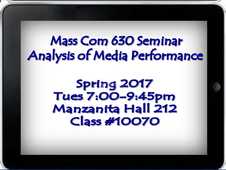MCom 630 | Seminar in Analysis of Media PerformanceExtended application of research and evaluation techniques as used in mass communication research to describe the quality of news media performance. Seminar emphasizes a theory-based analysis of the changing media ecosystem and its impact on journalism and audience engagement in the emergent participatory digital media culture.
Prerequisite: MCom600 Limited to Mass Communication Graduate Students Mass Communication Graduate Program
|
MCom630 Learning ObjectivesOverall Learning Goal: Develop critical thinking, research and evaluation skills to analyze the changing nature of news and its impact on journalism, and to identify strategies that foster an informed citizenry and transparency in the hyper-connected participatory digital society. Students will:
|
